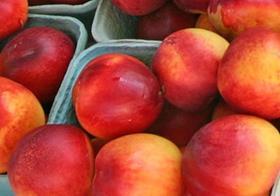
Hazel Technologies has announced the successful completion of peach, nectarine, and plum supply chain quality trials with the University of California, Davis.
According to the group, researchers found that Hazel Tech packaging can maintain post-harvest characteristics such as firmness and colour retention in seven different varieties of peaches, plums, and nectarines in standard supply chain conditions.
The trial was conducted on eight varieties of peaches, plums, and nectarines grown by HMC Farms in Kingsburg, California.
Hazel was applied to commercial peach, plum, and nectarine varieties following harvest and packing. The fruit was then stored in simulated retail supply chain conditions at UC Davis for up to 22 days and periodically assessed by a team of researchers for standard quality traits such as firmness and colour retention.
“We are extremely pleased to report that UC Davis researchers saw significant increases in peach, plum, and nectarine firmness or colour retention with Hazel compared to control fruit, even after 22 days in storage,” said Adam Preslar, co-founder and CTO of Hazel Technologies.
“Maintaining perfect stonefruit quality in the fresh supply chain can be a challenge for packers and retailers, and the consumer eating experience can suffer as a result,' he continued. 'We are thrilled to offer both the conventional and organic stonefruit industry products that can help packers and retailers provide top-quality fruit to the market, reduce waste, and increase sales. We look forward to partnering with UC Davis on trials in the future.'
“In our trials, we were able to show conclusively that in seven of the eight total varieties, there was stronger skin and firmer flesh due to Hazel treatment,” said Dr Barbara Blanco-Ulate, professor at the Department of Plant Sciences at UC Davis. “The Blanco Lab is committed to researching new post-harvest technologies related to fruit ripening and quality, and we are pleased to be working with Hazel Technologies on this new shelf-life solution for peaches, plums, and nectarines.”



